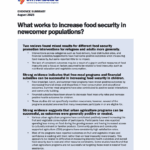Aim: Food security is defined by four dimensions: food availability, access, utilisation and stability. Resettled refugees face unique struggles securing these dimensions and, thus, food security when moving to a new country. This systematic review aimed to identify the challenges Australian refugees experience in achieving the four dimensions of food security. Methods: The Preferred Reporting Items for Systematic Reviews and Meta-Analyses (PRISMA) guidelines were followed; the SPIDER tool was used to determine eligibility criteria. Three databases were searched using terms relating to food in/security and refugees from 2000 to 20 May 2017. Results: Seven articles were retained for analysis. Studies were categorised against the four dimensions, with four studies identifying challenges against all dimensions. Challenges contributing to high levels of food insecurity in each dimension included: availability and cost of traditional foods, difficulty in accessing preferred food outlets, limited food knowledge and preparation skills and food stability due to low income and social support. Conclusions: Food insecurity adversely impacts refugee health and integration. Methodical research framed by the four dimensions of food security is imperative to address challenges to securing food security in refugee groups and assisting in the development of sustainable interventions.
A Systematic Review on the Impact of Trauma-Informed Education Programs on Academic and Academic-Related Functioning for Students Who Have Experienced Childhood Adversity
The purpose of this study was to conduct a systematic review of the existing literature regarding trauma-informed education programs and their impact on academic and academic-related outcomes. The articles included for review (n=15) contained data on trauma-informed education programs implemented in preschool, primary/elementary, and high school settings. Academic and academic-related outcomes reported included attendance, disciplinary…

